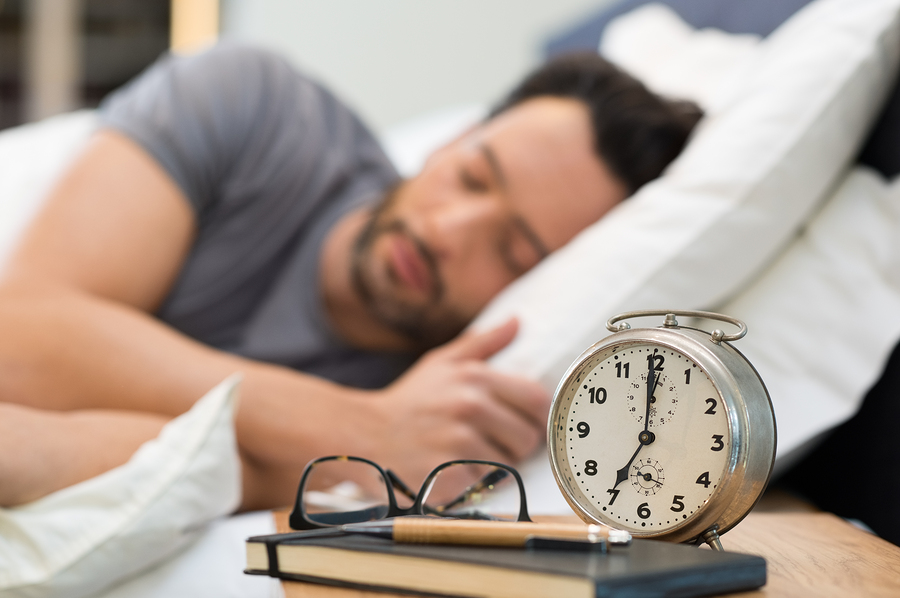- Make It Yourself Lavender Heart-Shaped Bath Bombs!
- 20 Things You Never Knew About “Down There”
- 12 Best Foods For Those Suffering From Arthritis Pain
- 12 Personal Hygiene Mistakes Almost Everyone Makes (Mom Never Told You About #4!)
- 15 Medicinal Plants And Herbs From The Cherokee People
- 12 Mind-Blowing Benefits Of Drinking Coconut Water During Pregnancy
- 12 Outstanding Winter Foods That Won’t Fatten You Up Like A Christmas Turkey
Is Getting TOO MUCH Sleep Dangerous?

Photo credit: bigstock.com
Most of us know that getting too little sleep is bad for our health. Insufficient sleep has been linked to all kinds of health issues like increased blood pressure, higher risk of heart attack or stroke, a weakened immune system and more. But not many people are aware that getting too much sleep has been linked to its’ own set of health risks. To make matters more confusing, some of these are the same risks caused by getting too little sleep! It seems there definitely is an ideal range of sleep a person needs each day in order to maintain optimal health. We’ll lay out the facts for you here and show you how to optimize your sleep.
How much sleep is too much?
The old axiom is to “get your eight hours” every night to be healthy and focused the next day. Getting less than five hours of sleep on a regular basis is almost universally considered unhealthy, but newer research indicates that getting more than 7-9 hours of sleep per night is unnecessary and could pose potentially serious health risks. The specific amount varies by individual, but most studies indicate nine hours is the upper limit for the safe amount of sleep.
What are the health risks of too much sleep?
1. More weight gain
A Canadian study published in 2013 studied the effects of sleeping more than nine hours each night on 276 adult volunteers for a period of six years. The study found that those individuals showed a higher propensity for weight gain than those who slept for shorter periods of time. Those sleeping more than nine hours nightly were 21 percent more likely to become obese than those who did not.
Continue to Page 2

Photo credit: bigstock.com
2. Increased risk of heart disease
A study showed that sleeping more than eight hours each night increased the risk of angina, or chest pain caused by reduced blood flow.
3. Greater risk of memory loss
One study monitored the effects of oversleeping (defined here as more than eight hours per night) on adult women for 14 years. The results indicated that oversleeping plays a role in accelerating “aging” of the brain and decline in cognitive function. The study found that the over-sleepers were effectively two years older from a neurological perspective than those who slept less.
Other studies have demonstrated a link between excessive sleep and an increased likelihood of developing neurodegenerative conditions like Alzehiemer’s disease.
4. Increased inflammation
Chronic inflammation has been linked to many different maladies, like hypertension, diabetes, and forms of dementia mentioned above.
Doctors can measure the degree of inflammation in a patient by measuring the levels of cytokines in the body, also known as C-reactive proteins (CRP). Higher CRP levels would correspond with higher levels of inflammation. CRP levels will increase with insufficient sleep, but newer research indicates that they increase with excessive sleep as well.
One study found that those sleeping longer than nine hours had CRP levels 44 percent higher than those sleeping less. Interestingly, the results seem to vary depending on the participant’s racial background. Those of white, Hispanic and black ancestry showed increased CRP levels with less than five and more than eight hours of sleep. By contrast, participants of Asian ancestry showed lower levels of CRP at the less than five hours of sleep. At more than eight hours however, the results were similar. As more research is carried out, we’ll develop a better understanding of the role that ancestry has in oversleeping risks.
5. Higher levels of physical pain, especially back pain
Spending too much time in bed can exacerbate muscle pain. This is due to fewer hours of physical activity, but sleeping position and the type of mattress a person uses also play important roles.
6. Increased risk of diabetes
The Canadian study mentioned above also showed that those sleeping longer than eight hours had increased likelihood of developing impaired glucose tolerance, which is a risk factor for Type 2 diabetes.
7. Higher risk of stroke
The University of Cambridge performed a study which analyzed data on almost 10,000 people over the course of 11 years to measure the effects of oversleeping. The researchers found that those who slept more than eight hours every night had a 46 percent increased risk of stroke. Analysis of data from older studies produced similar results.
Perhaps most alarming was the numbers linked to daytime drowsiness. Those who slept more than eight hours a day but also experienced daytime drowsiness had an alarming 90 percent increase in the likelihood of a stroke.
Continue to Page 3

Photo credit: bigstock.com
What steps can you take if you’re an “oversleeper?”
If you sleep more than eight hours once in a while you shouldn’t panic, but if this is happening on a consistent basis, you may want to take these ideas into consideration:
1. Set an alarm to wake you up after an appropriate time. Aim for no more than eight hours. Going to bed earlier will make this easier.
2. Keep a consistent circadian rhythm by not sleeping in on the weekends. This throws your whole rhythm off and makes it difficult to readjust to your sleeping schedule during the workweek.
3. Expose yourself to sunlight in the morning, so your brain recognizes the correct time to “wake up.” Try leaving the blinds or drapes open in your bedroom for this purpose. Similarly, get 30-60 minutes of sunlight each day so your brain understands that right now is “awake time,” while night is “sleeping time.” This will prevent your body from trying to compensate by sleeping too much.
4. Avoid excessive artificial lighting before bed, especially from electronic screens. Use a program like f.lux to filter out the blue light emitted by your screen. This will prevent your brain from being confused, and facilitate a normal and healthy sleep cycle.
5. Use a fitness tracker to monitor your sleep, and record any changes.
READ ALSO: 8 Simple Steps To Getting A Better Night’s Sleep Video
As always, talk with your doctor if you find yourself chronically oversleeping. Everyone’s body is different, and you must customize your approach to dealing with it in a way that best fits your unique health needs.
References:





























